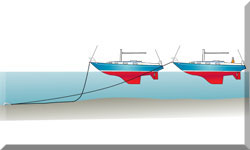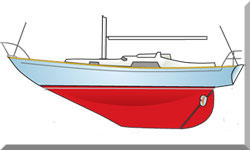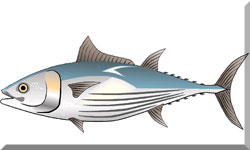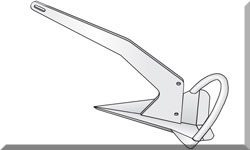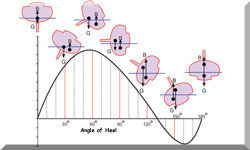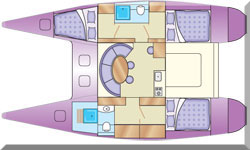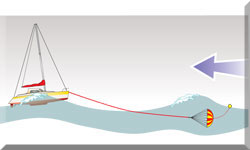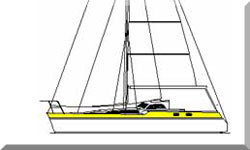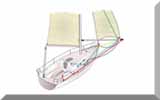- Home
- Cruising Boats
- Boat Galley
A Sail Boat Galley Layout for
Offshore Cruising
A practical, seagoing boat galley is a vital element in all good cruising sailboats. And it's not just the quality and layout of the individual components that make up the galley, but also where it's situated in the boat itself.
Some people enjoy cooking on a sailboat. I don't - eating's more my thing.
For me, anyone that can conjure up a nourishing meal on a pitching, rolling boat is a treasure beyond value and should be cherished unreservedly.
And anything that can be done to make his or her life easier is likely to bring rich culinary rewards.
An efficient galley is a good place to start, the principal requirements for which are...
A Good Location for the Galley
The location should be well ventilated and easily accessible to both the cockpit and the saloon. The common arrangement is for it to be at the foot of the companionway, and this has much in its favour.
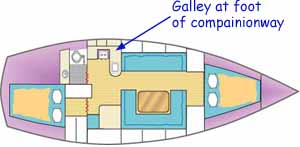 Is this the best location for the galley?
Is this the best location for the galley?This part of the boat is less prone to violent pitching, there's good natural ventilation through the companionway and hot food and drinks may be easily passed up to the cockpit.
There's not a lot you can do about the rolling, but the cooker should be gimballed on its longitudinal access which will largely take care of that.
Some centre cockpit boats that have a linear galley in the passageway linking the after-cabin to the rest of the boat, on the basis that there's not much else you can do with the space.
This is a less successful arrangement than those that have an L-shaped galley with the cooker and sinks in the conventional place, and only the work tops and refrigerator tucked into the passage way.
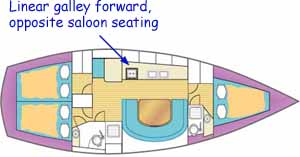 Or is this, more forward, location best?
Or is this, more forward, location best?Another common location for a linear galley is forward, opposite the saloon seating.
Not the best place for it in my view - it's just too far from the main hatch.
The chance of getting a full mug of tea from the galley to the cockpit in anything of a blow is pretty slim.
Ventilating the Galley
The cooking process, for those of you that aren't familiar with it, produces a deal of steam and heat which will create condensation and encourage the dreaded mildew.
An opening portlight or extractor fan above the galley will go a long way to relieving this unwanted side effect, if the ventilation provided by the companionway is insufficient.
A Good Working Layout for the Boat Galley
The three main units - cooker, sinks and refrigerator - should be close together so that the cook can reach all three without having to move more than a step or two, which is more easily achieved with a U-shaped or L-shaped galley than the linear arrangement.
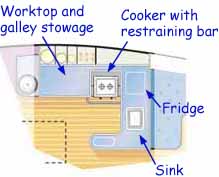 Cooker, fridge, sink and worktop arrangement in a practical galley arrangement
Cooker, fridge, sink and worktop arrangement in a practical galley arrangementA restraining harness should be rigged to secure the cook in close to the cooker when it's on the windward side of the boat, and there should be a stout metal bar across the front of the cooker to keep the cook from accidentally falling onto it when it's to leeward.
But beware! When secured by the harness, the cook has nowhere to go if he spills a pan of hot liquid, and many serious scalds have occurred this way. In boisterous conditions, it's a sound idea to wear a full length waterproof apron, or the lower half of your foulies.
There should be an adequate worktop area, with 3" (75mm) high sturdy fiddles, and a heatproof area to put down a hot pan.
Stainless steel sheet should be fixed to protect adjacent cabinetry and the hull side outboard of the cooker, as these surfaces can get very hot.
A good boat galley will have stainless steel dual sinks - one for washing, the other for draining. They should be deep enough (150mm to 200mm) to retain plates, and to prevent spillage when the boat rolls.
And it's no bad idea to have both a freshwater and a seawater supply at the sink. Just remember which is which when you're filling the kettle!
But there's more to consider...
Modern Appliance Options: You know, the galley isn't stuck in the past! While the basics of a cooker and fridge remain, the technology has really moved on, especially for the unique demands of offshore life. When we talk about energy-efficient refrigeration, we're not just thinking about keeping the milk cold. For long passages, power consumption is king. Modern 12V refrigeration systems, often using Danfoss or Secop compressors, are incredibly efficient. They sip power rather than gulping it down, which is crucial when you're relying on batteries charged by solar, wind, or a generator. Thinking about upgrading? Look for well-insulated units with these compressor types – they can make a huge difference to your energy budget.
Then there's the rise of induction cooktops. Now, I know what you might be thinking – they need a lot of power, right? And you're not wrong. But with advancements in battery technology and more efficient inverters, induction is becoming a viable and surprisingly safe option offshore. No open flames to worry about in a rolly sea, and they heat up incredibly fast. If you're considering this, you'll need to factor in a robust battery bank and an inverter that can handle the load, but the speed and safety benefits are worth considering for many.
Don't forget about combination ovens/microwave units. Space is always at a premium on a boat, isn't it? These clever appliances give you the functionality of both in one footprint. Perfect for reheating, baking, or even grilling in a compact space. They can be a real game-changer for meal variety on longer trips.
Finally, while not strictly in the galley, having a watermaker onboard dramatically changes how you use your galley. Suddenly, freshwater isn't a finite resource you need to conserve meticulously. This opens up possibilities for more elaborate cooking, easier cleanup, and a generally more comfortable experience. It's a significant investment, but for serious offshore cruisers, it's often considered essential.
Ergonomics and Safety in Heavy Seas: Let's face it, cooking offshore isn't like being in your kitchen at home. When the boat's bouncing around, staying safe and being able to actually prepare a meal requires some serious thought in the layout. Optimized workflow is key here. Think about how you move between the cooker, sink, and fridge. Can you do it with minimal steps and without having to traverse the entire galley, especially on a tack? U-shaped and L-shaped galleys are often favoured because they keep everything within easy reach.
And then there's secure storage solutions. We've all experienced the chaos of a locker coming open in rough seas! Good offshore galleys have robust latches on drawers and cupboards – the kind that won't accidentally release. Non-slip surfaces inside lockers and on countertops are a must to stop things sliding around. And clever storage ideas, like dedicated slots for plates and mugs, or fiddled shelves that really do their job, make a huge difference in keeping things secure and accessible.
Finally, don't underestimate the importance of rounded edges and secure fittings. Sharp corners become hazards when the boat's moving. Everything in the galley should be designed to minimize the risk of bumps and scrapes. And any fixed equipment, like the stove and sink, needs to be incredibly well-secured to the boat structure.
Material Science: The materials your galley is made from can significantly impact its durability, ease of cleaning, and even safety offshore. Modern galleys often utilize specific grades of stainless steel that are corrosion-resistant – crucial in a saltwater environment.
Composites are also becoming popular for countertops and other surfaces because they're lightweight, durable, and easy to wipe down. And solid surfaces like Corian offer a seamless and hygienic worktop.
Thinking about an upgrade? Consider how the materials will hold up to the rigors of offshore life and how easy they'll be to maintain.
Waste Management: This might not be the most glamorous topic, but it's a critical one for responsible offshore cruising. You can't just toss your trash overboard these days! So, your galley layout needs to incorporate solutions for trash storage and disposal. This could include dedicated bins with secure lids to prevent spills, perhaps even a system for compacting waste. And it's worth being aware of the regulations in different cruising areas regarding waste disposal – you'll need to plan accordingly.
Lighting: Good lighting in the galley is essential, not just for cooking but also for safety. Natural light from portlights is great when you have it, but for evenings or overcast days, well-placed artificial lighting is key.
Modern LED lighting solutions are energy-efficient, offer a long lifespan, and come in various color temperatures to suit different tasks and moods. Think about having both ambient lighting for general use and task lighting focused on the cooktop and work surfaces.
Integration with Boat Systems: The galley isn't an isolated unit; it's part of the boat's overall systems. When planning or upgrading, consider how it integrates with your electrical and plumbing systems. If you're adding power-hungry appliances like an induction cooktop, you'll need to ensure your battery capacity and charging systems can handle the load.
Similarly, the size of your water tanks and the type of pumps you have will affect your water usage in the galley, especially if you don't have a watermaker. A little forethought here can prevent a lot of headaches later.
Specific Appliance Recommendations: You're probably thinking, "Okay, a good fridge... but which one?" Right? When it comes to refrigeration for offshore, you'll often hear sailors swear by brands like Vitrifrigo, Isotherm, and Waeco (now Dometic). These guys build units specifically designed for the marine environment – they can handle the motion, are built to be corrosion-resistant, and often have features like spill-proof shelves. Look for models with Danfoss/Secop compressors; they're known for their efficiency and reliability.
Size-wise, think about the length of your trips and how many people you usually have on board. Too small, and you're constantly rationing; too big, and you're wasting precious power.
For cookers, gimballed propane stoves are still the workhorse for many offshore cruisers. Brands like Force 10 and Eno are well-regarded for their robust construction and safety features like thermocouple shut-offs (which stop the gas flow if the flame goes out). Consider the number of burners you typically use and whether you want an oven. Some smaller boats opt for two-burner models without an oven to save space and gas.
If you're leaning towards induction, you'll need to research brands like Kenyon or Webasto and carefully check their power requirements and your boat's electrical system capacity. Don't forget you'll need induction-compatible cookware too!
And for sinks, as mentioned earlier, stainless steel double sinks are ideal. Look for deep basins (at least 150mm) to keep things contained when you're heeled over. Brands like Whale or even good quality domestic stainless steel sinks designed for RVs can work well, just ensure they're robust and easy to clean.
Power Management for Galley Appliances: So, you're eyeing that fancy induction cooktop or a super-efficient freezer? Great! But let's talk power. Your battery bank is the heart of your electrical system offshore. For serious cruising, most folks recommend a substantial house bank, often lithium-ion these days for their high capacity and low discharge rates, though good quality AGM batteries are still a solid choice. Think about your daily power consumption – lights, navigation, autopilot, and now your galley appliances. A rough calculation can help you determine the amp-hours you need.
Then comes charging. Relying solely on the engine alternator isn't ideal for long periods at sea. Solar panels are fantastic for topping up batteries during the day, and the technology has improved dramatically. Consider flexible panels that can conform to your deck or rigid panels mounted on arches or davits. Wind generators can also be a great source of power, especially on longer passages with consistent winds. And if you plan on running power-hungry appliances for extended periods, a generator (either diesel or petrol) might be a necessary evil.
Finally, the inverter is what allows you to run AC appliances from your DC battery bank. You'll need to choose one with enough continuous power rating to handle the maximum draw of your appliances. For an induction cooktop, this could be significant. Look for true sine wave inverters, as they provide a cleaner power supply that's better for sensitive electronics. Don't skimp on the inverter – a cheap one can cause all sorts of problems.
Water Storage and Conservation: Water is life offshore, and managing it wisely in the galley is crucial. When thinking about water tankage, consider the length of your typical passages and the number of people on board. A general rule of thumb is about 2-3 liters per person per day for drinking and basic hygiene, but you'll need more if you're doing a lot of cooking or have a watermaker failure. Having multiple tanks is a good idea for redundancy.
In the galley, there are several water-saving techniques you can employ. Rinse dishes in seawater first if you have a saltwater tap. Use minimal water for boiling – often just enough to cover the food. Soak stubborn pots and pans instead of scrubbing them under running water. And be mindful of leaks! A slow drip can waste a surprising amount of water over time.
If you're thinking about a watermaker, consider its output in litres per hour, its power consumption, and the ease of maintenance (filter changes, pickling for storage). They can be a game-changer for long-distance cruising, giving you independence from shore-based water supplies.
Securing Food and Provisions: Picture this: you're sailing along nicely, and suddenly a rogue wave hits. The last thing you want is cans and jars flying around the galley! Effective food storage is paramount. For refrigerated items, use containers with secure lids to prevent spills. Mesh bags or bins can help organize items and allow for some airflow. For dry goods, decant them into airtight containers (Tupperware or similar) to protect them from moisture and pests. Label everything clearly!
Vacuum sealing can significantly extend the shelf life of many foods, both refrigerated and dry. It also reduces the volume of food, making it easier to store. Consider investing in a good quality vacuum sealer.
When organizing dry goods, think about accessibility. Store frequently used items in easily reachable places. Use fiddled shelves or dividers in lockers to prevent things from shifting. Bungee cords or netting across locker openings can also provide an extra layer of security in rough seas. And always have a well-documented inventory of your provisions so you know what you have on board and can plan your meals accordingly.
Cooking Techniques for Offshore Conditions: Forget delicate sauces and multi-course meals when the boat's heeled over at 30 degrees! One-pot meals are your best friend offshore. Think stews, curries, and pasta dishes where everything cooks together. They minimize the number of pots and pans you need to juggle and clean.
A pressure cooker can be a fantastic tool offshore. It significantly reduces cooking time, which saves fuel (if you're using a gas stove) and minimizes the time you're actively working in a potentially unstable environment. However, always follow safety guidelines carefully!
Thermal cookers (like a Thermos on steroids) are also brilliant for offshore cruising. You bring food to a boil on the stove, then transfer it to the thermal cooker, where it continues to cook slowly without any further heat source. This saves energy and is incredibly safe as there's no open flame or hot pot to worry about.
And a general tip: prepare as much as possible before you set sail or during calmer periods. Chop vegetables, marinate meats, and even cook entire meals that can be easily reheated. This makes meal preparation much easier when the conditions get challenging.
Maintenance and Troubleshooting: A little preventative maintenance can save you a lot of headaches (and potential disasters) offshore. Regularly clean your galley, paying attention to areas where food and moisture can accumulate. Descale your kettle periodically to improve efficiency. Check the seals on your refrigerator and freezer to ensure they're airtight.
For troubleshooting, keep a basic toolkit and some spare parts on board if possible (e.g., fuses for electrical appliances, basic plumbing fittings). Learn how to bleed your propane system if you have one. If your sink drain gets blocked, a simple plunger or a bent wire hanger can often do the trick. Familiarize yourself with the manuals for all your galley appliances so you know how to identify and potentially fix common issues. And don't underestimate the value of a good onboard repair manual!
Regulations and Best Practices: When it comes to regulations, be aware of any rules regarding the installation and inspection of propane systems in your cruising area. Some jurisdictions have specific requirements for ventilation and shut-off valves. Also, familiarize yourself with regulations regarding waste disposal at sea – it's illegal to dump plastic and other harmful materials in many areas.
Best practices for galley safety include always using your stove's gimbal lock when underway. Wear non-slip footwear in the galley. Know where your fire extinguisher and fire blanket are located and how to use them. Secure all loose items before setting sail. And always have a designated "galley person" in rough conditions to minimize traffic and potential accidents.
DIY Galley Modifications and Upgrades: Many boat owners enjoy tackling galley projects themselves. If you're thinking about adding extra fiddles to your countertops, you can often use teak or other hardwood strips secured with screws and adhesive. Improving ventilation might involve installing an additional opening portlight or a small 12V extractor fan. When installing new appliances, always follow the manufacturer's instructions carefully and ensure all electrical and plumbing connections are done safely and correctly. There are tons of online resources, sailing forums, and even YouTube videos showing examples of successful DIY galley modifications. Just be sure to do your research and don't take on a project you're not comfortable with.
Cost Considerations: Finally, let's talk money. The cost of a galley refit or upgrade can vary wildly depending on the scope of the project and the quality of the equipment you choose. Basic upgrades like adding fiddles or improving storage can be relatively inexpensive. However, installing new appliances like a high-end refrigerator, induction cooktop, or watermaker can be a significant investment.
When budgeting, consider not just the initial purchase price but also the cost of installation (professional vs. DIY), any necessary upgrades to your boat's electrical or plumbing systems, and ongoing maintenance costs (like filters for a watermaker). It's often helpful to get quotes from marine equipment suppliers and installers to get a realistic idea of the costs involved.
Recent Articles
-
Daily Current Draw Calculator for Sailors
Sep 16, 25 02:29 PM
Stop guessing & protect your batteries! Get the ultimate daily current draw calculator. This easy-to-use tool comes with a free gift to help you cruise with confidence. -
Deep Cycle vs Starter Batteries: Why Deep Cycle is the Right Choice
Sep 16, 25 12:37 PM
Understanding the difference between a deep cycle marine battery & a starter battery is key to optimising your boat's electrical systems. We'll guide you through it. -
Reducing Your Sailboat's Current Draw: A Guide to Saving Power
Sep 16, 25 09:09 AM
Want to extend your battery life? Learn how to start reducing your sailboat's current draw by making simple upgrades and smarter power choices on board.

